creation
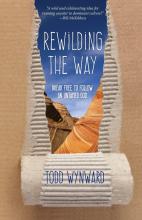
REMEMBER THE thrill that went through you when C.S. Lewis told you Aslan is not a tame lion? I sometimes forget about this untamed image of God when ensconced in my “safe” Christian community.
In his recent book Rewilding the Way: Break Free to Follow an Untamed God, Mennonite minister and permaculture practitioner Todd Wynward reminds us of the importance of the wilderness in the Bible and in Christian history. Wynward calls his book an “unapologetic rallying cry to rewild a Christianity that has become terribly tame.”
He argues for a third way of enacting discipleship: not the radical renunciation of ascetics, open only to the childless and unattached, nor a life of unexamined affluence, but a life of spiritual resilience where we develop strong, place-based communities of praxis who care for one another and creation through the power of the Holy Spirit. He invites us to remember the transformation that occurs through the wilderness testing of Moses and the Israelites, many of the prophets, John the Baptist, Jesus, the apostle Paul, and the desert fathers and mothers. In the wilderness we learn about “enough,” trusting God, and how much we need one another. We learn about our paradoxical smallness and value to our loving God.
A text like this could reinforce Christian contemplative navel-gazing and a personal experience of God as only available in the sublime elements of nature, unreachable in a sullied built environment. Wynward avoids this pitfall by focusing on community and a covenanted right relationship with God, others, and creation. He discusses environmental justice, activism, and urban projects that rewild spaces closer to home.
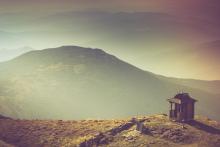
As it turns out, the faith community may have a marked advantage when it comes to dealing with global warming. According to University of British Columbia social psychologist and author Ara Norenzayan, religion primes cooperation. In his work, Norenzayan has found religious societies to be more cooperative than non-religious societies — particularly where a group's survival is threatened.

After seven long years of review, the White House plans to reject the request from a Canadian company to build the Keystone XL pipeline, according to The New York Times.
Envrionmental groups across the United States, including 350.org, have begun celebrating the news as a victory for climate activists. Sojourners has long spoke out against the construction of the Keystone pipeline and celebrates this news a win for all those advocating for the protection of creation.
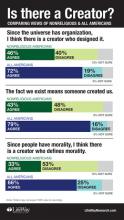
You don’t have to believe in God or identify with any religion to see a creator’s hand in human life and morality, suggests a new survey.
LifeWay Research’s overall finding — that most Americans believe there is a creator who designed the universe and defines human morality — is not surprising. After all, 3 in 4 U.S. adults identify with a religious denomination.
The surprise is that so many people who don’t identify with a religion — so-called nones — agree.

BY THIS TIME in the church calendar, the liturgical highlights feel like they’ve slowed considerably. The excitement of Easter is gone, not to be replaced by another holy season until Advent. Pastors and parishioners, who all stayed away the week after Easter, hopefully have returned. The holy days seem to have drained away into the season of counting the weeks, depressingly named as “ordinary time.”
Ecclesially speaking, however, the holy days are amping up considerably at this point. Easter season hits a crescendo with these latter weeks. The ascension of Christ used to be marked as one of the greatest feast days of the year, up there with Easter, Christmas, and Pentecost. It signifies Christ’s rule over all things, hidden now, to be full-blown and publicly obvious to all in God’s good time. Christ himself insists that he must go away in order that the Advocate would come and, in John’s language, to enable us to do even “greater works” than Jesus ever did. Pentecost is a new outpouring of the triune God to empower the church to do those greater works. There is much here to be celebrated. A crescendo, not a tapering off.
These texts present a reign inaugurated with resurrection in which the poor eat and are satisfied. One built on friendship and common love. It suggests a God who likes getting born enough that God decided to go through the experience and told the rest of us we should go through it all over again. Is that bodily enough for you?

SHE WAS MAD—fuming.
Thirteen black evangelical leaders rolled across Southern states on a speaking tour of historic black colleges and universities. On a mission to call forth the next generation of black leaders, we traversed the land where our ancestors had worked fingers to bone, drank from separate fountains, and cut loved ones down from trees like dead fruit.
But this is not what made Vera mad.
For the last hour a crowd of black leaders sat, stood, and leaned in as we shared our stories of barriers to advancement within white evangelical organizations. It wasn’t a mean-spirited conversation. It was a needed one—a healing one. Our stories were strikingly similar, even though none of us had worked in the same organization.

Pope Francis is a straight shooter who does not mince words: "If we destroy creation, creation will destroy us,” the pontiff said last year. “Never forget this!”
The pope’s warning and calls for action have galvanized many religious leaders from across Maryland to step up our efforts to protect God’s creation from climate change disruptions. We understand that it is the poor and most vulnerable among us who are bearing the brunt of human-induced climate change. Unless we act now, the impacts of devastating super-storms, massive floods, droughts, and crop failures will only accelerate. Refusing to bury one’s head in the sand and facing squarely the reality of climate change is a fundamental issue of justice and respect for life.
This is why I, a Franciscan friar priest, have joined more than 230 Maryland religious leaders, including Bishop Dennis Madden of the Catholic Archdiocese of Baltimore and six other leaders of Christian denominations across Maryland, in issuing an urgent, moral challenge. We are calling on Marylanders — including our elected officials — to take action on climate change by helping to shift our state’s energy policy towards renewable, clean energy sources.

Sometimes we dehumanize people by speaking, thinking, or imagining about them in generalizations, by covering their true identity with generic labels and terms that are impersonal, cold, and less meaningful. For example, you can refer to your brother as “someone that I know” or your best friend as “this one guy.”
We often do this when we want to create separation or disassociate from others — often in order to protect ourselves, make ourselves look better, or attack others. Thus, we refer to our spouse as “this person I know” when we’re agreeing with a coworker about people who hold an opposing political belief we disagree with, or offhandedly use the phrase “this guy I know” about our dad when talking about annoying habits that we can’t stand.
We see Peter do the same thing in the Bible, referring to Jesus — his savior, closest friend, companion, teacher, and leader — as simply “him” when being accused of knowing Jesus right before the crucifixion.
Luke 22: 56-57: Then a servant girl, seeing him as he sat in the light and looking closely at him, said, “This man also was with him.” But he denied it, saying, “Woman, I do not know him.”
I don’t know “him.”
One word: him.
No harm done, right? It’s just a simple pronoun.
We do the same thing all of the time.
Him, her, she, he, them, those people, etc.
As innocent as this practice may seem, the ideas behind them are more cynical, and it becomes much more serious for Christians when we use terms, thoughts, and ideas as a way to disconnect people from God.
I GREW UP IN RURAL IRELAND in the 1950s in a world surrounded by trees.
Close to my home, a ribbon of horse chestnuts lined both sides of the road. Each summer their intertwining canopies shut out the light, which gave the road its name—the dark road. In the fields around our house there were stands of oak, birch, elm, and sycamore. About 40 yards to the south and west, my father planted a shelter belt of Leylandii. We had different varieties of apple trees in the orchard, and two pear trees.
In 1962, just as the Second Vatican Council was beginning, I entered St. Columban’s seminary to be a priest. The seminary was located on a large estate called Dowdstown in County Meath. More than 150 acres were covered in woodlands full of indigenous trees such as oak, hazel, holly, ash, Scotch pine, willow, elm, and rowan. There were also exotic species, including a number of the sturdy cedars of Lebanon, a variety of cherry trees, and even a few California redwoods. The folklore in the area was that the trees had been planted in the 1820s by Gen. Robert Taylor, who had fought alongside Wellington at the Battle of Waterloo.
Trees are the dominant life form on land—and the longest-lived creatures on earth. During my seven years in seminary, while studying philosophy, theology, spirituality, and scripture, we never once looked to the natural world or trees for insight into our relationship with God, other human beings, or other species. And there is so much to learn! Sadly, theology and scripture presentations were isolated almost exclusively to the divine-human relationship, with little consideration given to the rest of creation.

Let me tell you about the time I got re-directed by a Pepsi can.
It happened a few years ago. I’d started rethinking a lot of things about my life — what I wanted to accomplish with it, how God played into all of it — and decided to write my thoughts as I went along.
Eventually I got the idea that I could package my writing into a book that might help others who are going through the same things. Writers fantasize about some day having a best-seller; maybe this would be mine. I wrote and wrote and wrote and stepped back one day and read all of it and realized something.
It was awful.
I’m not so good at this type of writing. Expressing thoughts and feelings is a lot harder than reporting on events. Words are so inadequate. It’s so easy to cross the line between being helpful and being insufferable. At times, I sounded like a pompous ass.
So, what to do?
I went back and rewrote. And rewrote again. I decided to try to make it breezier and more conversational — that’ll do the trick. I read it again and realized that I now sounded like a breezy, pompous ass.
It’s called writer’s block, and it felt like a dead end. Maybe I should wait a few years and try again then. Hit define and delete, give up the struggle and move on. That seemed like the best thing to do. Stop trying to create for now.
I went jogging to mull it over.
It was a beautiful autumn evening with a wonderful, warm breeze out of the south. I’d just finished my jog and was walking around the block to cool down, enjoying the wind on my sweaty face, when a sound got my attention.
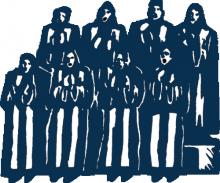
The deep, dark secret of the church is that the beliefs and convictions of Christians are often shaped far more by the hymns we sing than the theological tomes gathering dust on our bookshelves. Songs are avenues for praising God, but they are also tools for imparting knowledge. Singing is a theological exercise, so the words printed in hymnbooks or flashed on screens deserve attention and reflection.
“How Great Thou Art” has been sung in churches, automobiles, and probably the occasional shower since the late 19th century. Long used in traditional worship services, many contemporary artists are offering their own renditions of this classic and adapting it for more contemporary settings. Even Carrie Underwood (no relation) is getting into the act.
This is an ode to God’s majesty and power. It testifies to the beauty created by God’s hand and witnesses to the connection between the love behind God’s creative acts and the love poured out by Christ on the cross.
The famous opening line, “O Lord my God, When I in awesome wonder, Consider all the worlds Thy Hands have made” sets the stage. They also easily get stuck in your head playing on endless loop.
Creation – stars, thunder, forest, birds, majestic mountains, gentle breezes, and everything else – indicates the greatness of God. It provokes wonder among us humans, forcing us to acknowledge the subordinate relationship between creature and Creator. We cannot do what God has done; our accomplishments will always pale in comparison.

I invite you to stop reading this now, listen to a copy of the hymn “For the Beauty of the Earth,” and go sing it in celebration while walking around your neighborhood.
If you’re still with me, I’ll explain why:
Since learning the hymn several years ago, it has come to mind in many memorable places that now fill my mental landscape whenever I sing the hymn. One of those places is a park overlooking the Anacostia River near my house in Washington, D.C. Kenilworth Park was built on the site of a city dump that was plowed over 40 years ago and is now undergoing a remediation process to control suspected groundwater contamination. But despite its tainted legacy, it’s still one of the most beautiful places in Washington D.C.
The park constantly reminds me of the distance between what is and what could be. It’s full of potential, but sometimes the park’s potential is the only positive thing I see. On a recent walk through it, I came to my favorite overlook across from the National Arboretum and was momentarily struck by the contrast. The overlook is always full of trash from the river and at times overgrown with invasive plants, but this time, as I walked up, I caught a glimpse of a Northern Harrier flying along the river. I had never seen a Northern Harrier, much less so close to my house and in such an unlikely place. It momentarily caught me and my bird-watching friends breathless; we were reminded of the potential always hidden within the park.

Praise God, from whom all blessings flow;
Praise [God], all creatures here below;
Praise [God] above, ye heavenly host;
Praise Father, Son, and Holy Ghost, Amen.
Words by Thomas Ken (1674)
The Doxology was my favorite hymn growing up. We would sing it every Sunday in church at the end of the service, mostly a cappella. I was amazed at the different harmonies and range in which the hymn could be sung. I loved how simple the words were. But I did not understand the words fully until well into my adult life. As a kid, I immediately disregarded things like animals, plants, insects, and fish as creatures that could praise God. Surely the act of praising God is only reserved for the sentient beings, with a conscience and the ability to say in words “praise God.” No way would God receive the praises of a mosquito, or fern or cat or pig.
It took the glory of creation itself for me to fully understand the words of the Doxology. A year out of college, I was sitting on a kayak in the middle of Doubtful Sound, New Zealand surrounded by snowcapped peaks that dropped right into the water. The sun was shining, dolphins were swimming nearby, and the birds were chirping. Then the song hit me “Praise God, all creatures here below.” I could hear the songs of praise from his non-human creatures. It finally dawned on me that my songs of praise paled in comparison to the winds that touch the peaks of mountains, the perfect songs of birds and the language of dolphins. They are all songs of praise!

Many years ago, I sat in a church that resembled nothing like the church that I barely frequented while growing up. As the overhead lights dimmed in preparation for opening song, a blue-ish red hue washed over the stage to what felt like a concert opening and the following lyrics for “Indescribable” emerged on two oversized screens flanking the worship team:
From the highest of heights to the depths of the sea
Creation’s revealing Your majesty
From the colors of fall to the fragrance of spring
Every creature unique in the song that it sings
All exclaiming …
These song lyrics stuck with me because they remind me of how God is manifest in our natural world, where grace and interconnectedness are reflected in species that are intricately dependent on one another, and where the sheer beauty of our earth often becomes more apparent when we are able to step away from our industrialized lives and behold a starry night or a hike in the woods.
These lyrics also remind me of the part in Genesis where Adam is first put in charge of taking care of Eden and then gets to name all the animals, implying that he is responsible for them too:
“The Lord God took the man and put him in the Garden of Eden to work it and take care of it … Now the Lord God had formed out of the ground all the wild animals and all the birds in the sky. He brought them to the man to see what he would name them; and whatever the man called each living creature, that was its name. So the man gave names to all the livestock, the birds in the sky and all the wild animals …” (Gen 2:15; 19-20).
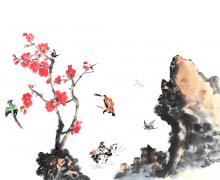
In these days barren fields will sprout trees
The deaf and blind will hear and see
The dead will raise and begin to breathe
The earth will groan in pain to see
The sons of God declare to be
His full and glorious family
The beautiful, perfect bride of Thee (Wash Me Clean, Page CXVI)
I am a city girl through and through — I’ve never lived outside of an urban context. Although my family lived in Queens (represent!), our church and community were in the dense and often treeless “ghetto” of Alphabet City, a neighborhood on the Lower East Side of Manhattan. My experiences of nature have mostly consisted of front and back yards, parks, and occasional trips to the beach or camping. And because I grew up in and spent most of my life in communities of the poor and marginalized, most of my experiences of God have centered around what Divine mercy, justice, healing, liberation, and restoration look like in the human heart.
In other words, it’s very easy for me to grasp the idea of a “New Jerusalem” or “a city whose architect and builder is God.” It’s easy for me to see the human component of God’s kingdom and what it means for people. It’s not so easy for me to imagine trees “clapping their hands” or even fully to appreciate the majesty of God’s handiwork in the stars ... because I’ve rarely seen a night sky free from light pollution. It’s not easy for me to imagine what a renewed creation would look like apart from new hearts and restored people.
Colloquially known as the “Monkey Trial,” the Tennessee v. John Scopes trial ended on July 21, 1925, but 89 years later, the American public is still debating on where it stands with religion and science education.
John Scopes, a public school teacher, was charged by the state for teaching evolution because one of its laws prohibited any public school curricula that contradicted creationism. The trial began on July 10, 1925, and Scopes pled not guilty. Along with other members of the community, Scopes had planned the curriculum as a publicity stunt.
Eighty-nine years ago today, Scopes was found guilty and sentenced to pay a $100 fine — an estimated $1,300, when adjusted for inflation.
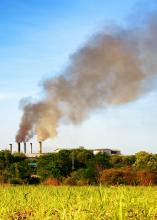
"The Clean Power Plan is a great step forward for our country in taking climate change seriously. It’s clear that President Obama cares about the legacy he leaves to today and into future generations. While there is a lot more that can and should be done by this Administration and by Congress, President Obama deserves our appreciation for embracing the common good and taking such a big step to preserve the earth for our grandchildren’s grandchildren."
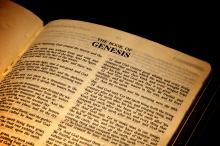
To ignore climate change is to abuse the moral call to care for the environment, and generations to come will suffer.
Some of the most inspiring words in the entire Bible are found in the opening pages of Genesis. Here we are told that humans were created in God’s image and given a divine mandate to care for Creation (Gen. 1:26-31). Our vocation—our calling—is to partner with God in preserving and sustaining the earth with all the creatures and species that God has made. The word used in most translations is “dominion,” and the true meaning is what we would today call “stewardship.”
Unfortunately these passages have often been used and abused to advance countless agendas, often to the great detriment of the Earth and its inhabitants. The deep sense of stewardship implied by and inherent in these verses is ignored and the word “dominion” has been interpreted as domination—and a license to destroy. Such thinking is not just unfaithful to God; it is dangerous to all God’s creation and creatures.
The most recent example of this unfortunate mindset can be seen in the recent comments made by Sen. Marco Rubio (R-FL) denying that human activity contributes to climate change.
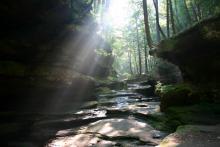
There’s an old hymn that many Christians have sung for nearly a century. “How Great Thou Art” celebrates the glory of God while considering, “all the works thy hands have made.” It reminds me of the psalm that reads, “The heavens are telling the glory of God; and the firmament proclaims his handiwork. Day to day pours forth speech, and night to night declares knowledge.”
Creation, therefore, is a witness to the wonder and awe of God. Although humanity has been given the honor of bearing God’s image, the earth shows God’s creativity and ingenuity. Over the years I’ve heard so many stories of people finding faith in God, not because of brilliant arguments, but because they are in awe of the complexity and glory of the created world.
But creation is not just a unique witness to God’s glory — it is, as the apostle Paul wrote, “groaning” waiting also for its redemption. This past Easter Sunday, Christians all over the world sang joyful songs of resurrection and renewal. Many of these songs proclaim freedom for all of creation — not just for humanity. One church I know of even sang “Joy to the World,” in celebration that the power of Christ’s resurrection extends “far as the curse is found.”
It’s hard to face, but humanity — image bearers of God — is largely responsible for destroying much of this great witness to God’s glory.
 Editor's Note: Sojourners is celebrating Earth Week with a special message series every day next week. Click here to join us!
Editor's Note: Sojourners is celebrating Earth Week with a special message series every day next week. Click here to join us!
“Behold, I am making all things new!” says Jesus in the book of Revelation. It’s this spirit of hope and second chances that we celebrate at Easter time. Life triumphs over death and decay. We get a second chance.
But what about our planet? A cursory glance shows us that God’s creation could use some renewal.
Creation is definitely groaning. We’re losing species, spilling oil, and changing our climate at an alarming rate. We’re building sea walls and responding to pumped-up natural disasters. Energy companies are pushing for even more access to the fossil fuels that are harming God’s creation. Action from Congress seems far away, and moneyed special interests are working hard to block other kinds of action.